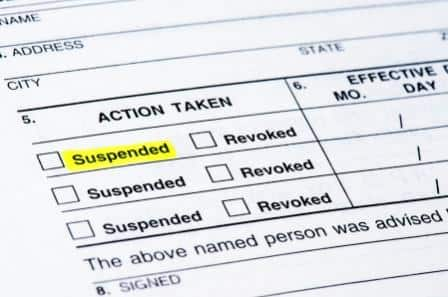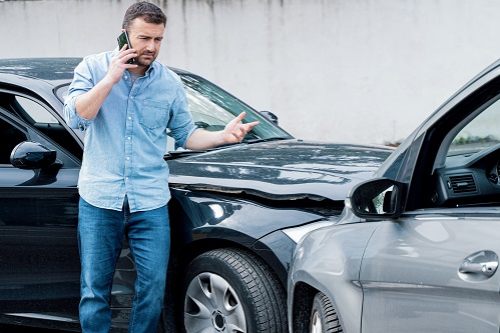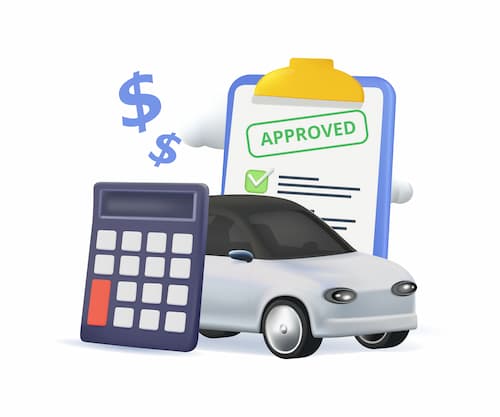How do you reinstate a suspended drivers license?
The authority that suspended your license, whether that's the DMV or a court, will provide you with the list of requirements to get your license back.
If your suspension is due to a major violation like a DUI, you may be required to attend classes and pay fines. In some states after even a first-time DUI you may have to serve time in jail or perform community service.
You'll also have to wait a prescribed period of time, typically anywhere from three months to a year, before applying for reinstatement. In most states, you will need to ask your insurance company to file an SR-22 certificate for you. An SR-22 is a car insurance company’s guarantee to the state that you are carrying the legally mandated coverage.
Other suspensions, such as those for minor traffic offenses or non-driving offenses like nonpayment of child support, may not require an SR-22 filing. But you must still meet the state’s conditions, whether it is simply not driving for a year or making good on court judgment against you, to get your license back.
Are there legal organizations that can help get your license reinstated?
If you aren't sure what to do when your license has been suspended, seek help.
"People just don't know what the consequences are if they do nothing," says Molly Gena, Managing Attorney at Legal Action of Wisconsin.
Unfortunately, that's what many people do. They can't pay, so don't go to court. Then either quit driving, and lose jobs, or drive on a suspended license.
Most areas have some kind of legal services organizations, nonprofits that can help people at a low cost or for free. At court, lawyers such as Gena can:
- Get the original suspension lifted
- Have a payment plan arranged
- Get a judge to order community service instead
- Find payment assistance.
"Every state is definitely different, but I would say that if you can, try to go to court to see if you can work something out," Gena says. "And if not, to consult a lawyer, or legal services."
Can you get a hardship license?
In some situations, you might be able to apply for a hardship license, also called a restricted license. This is a license that allows you to drive only for very specific reasons, mainly to get to work and back, but also for things like medical appointments, court-ordered appointments or classes and school.
You might have a waiting period before you can apply. The rules vary, so ask the DMV if you're eligible and how to apply.
What you should know about license suspension
When your license is suspended, you'll need to follow some rules and prepare for what comes next. Here are a few dos and don'ts of a suspended license.
Don't drive with a suspended license
A conviction for driving while your license is suspended can turn a minor problem into a major one. You'll wind up with more legal troubles and likely a longer suspension, or possibly even have your license revoked for good.
If you're not saddled with multiple convictions you may be eligible for a restricted or a conditional license. Offered in 39 states and the District of Columbia, according to the American Association of Motor Vehicle Administrators (AAMVA), these provide limited road privileges to drive to work, school or doctor's appointments.
Do compare rates for high-risk insurance
When your license is suspended, you are likely to lose your auto insurance coverage, although there are some ways to keep car insurance with a suspended license. If you lose your insurance, the gap in your coverage will hurt your rates. What's more, if your license was suspended for a serious violation, you're even more of a risk to insurance companies.
Car insurance rates for drivers with violations on their records vary hugely from company to company. If you have a very serious violation or multiple violations, you might need to shop with a non-standard, or high-risk, car insurance company. You can expect to pay some of the highest rates around. Shop around as soon as you can to find the best rates.
Do prepare to file an SR-22
An SR-22 is a certificate of financial responsibility that the insurance company files with the state, to attest that you do, indeed, have at least minimum liability coverage. An SR-22 filing itself usually costs about $25 – though whatever infraction caused it probably will send your insurance rates up more.
The SR-22 is usually required for three years, but it can vary by state and depending on the violation.
Reinstating a suspended license: Final thoughts
If your license has been suspended, the best thing you can do is to follow all of the instructions that are provided and make sure you adhere to the rules of your suspension. The sooner you meet the requirements to get your license back, the sooner you'll be back on the road.
While it can be a frustrating process, breaking the rules by driving or avoiding court-ordered classes won't do you any favors. Instead, focus on meeting the requirements and keeping a clean record going forward.
 If your license is suspended, getting it back quickly is your top priority. To reinstate your license after a suspension, you likely have to complete a series of steps; what those steps are depend on the reason your license was suspended.
If your license is suspended, getting it back quickly is your top priority. To reinstate your license after a suspension, you likely have to complete a series of steps; what those steps are depend on the reason your license was suspended.


